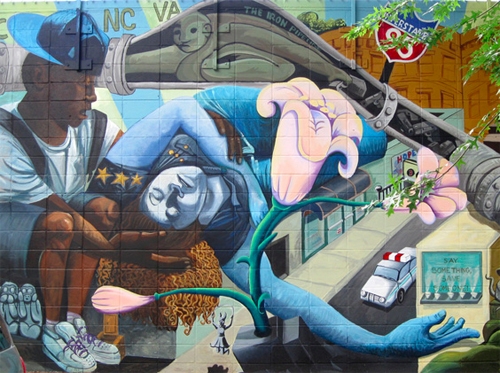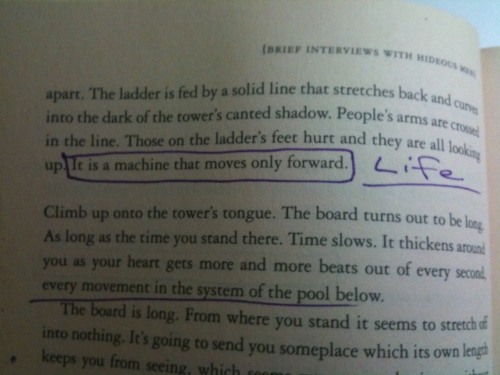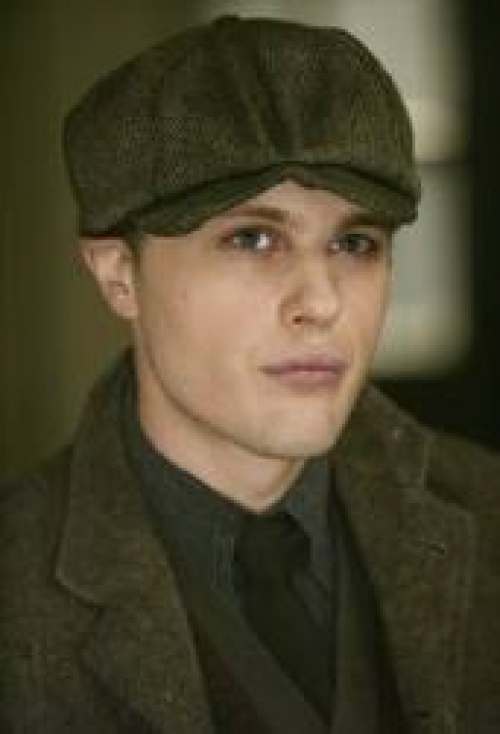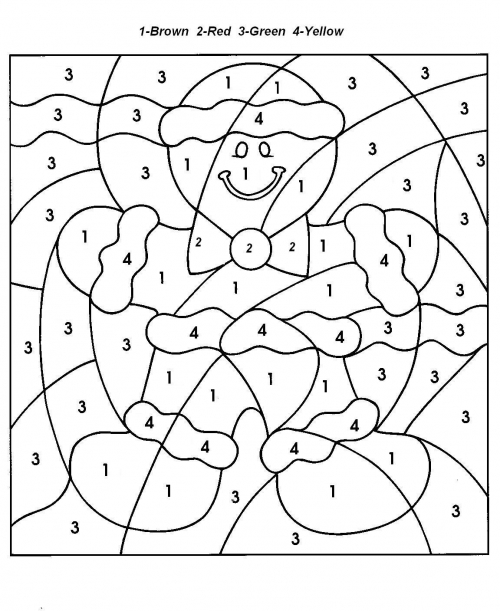
Cormac McCarthy, one of the most extraordinary prose writers of our time, spends his days in an office at the Santa Fe Institute, where he types his novels on an Olivetti. As The Chronicle of Higher Education reports, his involvement at the scientific research institute has deepened: McCarthy copy-edited one of his colleagues’ books. “He made me promise he could excise all exclamation points and semicolons, both of which he said have no place in literature,” says Lawrence M. Krauss, whose 2011 book Quantum Man, a biography of Richard Feynman, got the McCarthy treatment.
I started thinking about the equally extraordinary Richard Feynman and his memoir, Surely You’re Joking, Mr. Feynman!, whose title would suffer at least one obvious chop if McCarthy got his hands on it. McCarthy loves dialogue without much attribution or explanation, and his furious-yet-controlled prose—"He was sat before the fire naked save for his breeches and his hands rested palm down upon his knees"—as well as his propensity for extraordinary violence are a far cry from Feynman's excitable, jocular tone: "He didn't know I didn't know, and I didn't know what he said, and he didn't know what I said. But it was OK! It was great! It works!"
But how would the author of Blood Meridian, No Country for Old Men, and The Road have edited Mr. Feynman’s book? We offer a suggestion below.
ALL THE PRETTY DISBELIEVERS
OR THE EVENING MERRIMENT IN MR. FEYNMAN'S QUARTERS
1. The Child Fixes Radios by Thinking.
See the child. He is eleven or twelve, he sets up a lab in the house. It is nothing more than a wooden packing box into which he has set shelves, and he has a heater wherein he stokes hogfat and cooks french-fried potatoes day upon day. He also possesses a storage battery and a lamp bank.
The lamp bank he builds with sockets he screws down to a wooden base. When the bulbs were in series, all half-lit, they would glow. Sublime, splendid.
He lights up the bulbs and drives burnished iridescent daggers into the naysayers who come upon his lamp bank. The dead lie by the lamp bank in a great pool of their communal blood. It has set up into a sort of pudding crisscrossed with wires from the storage battery. It has seeped into the floorboards and in between the grooves of the child’s boots. The child surveys the blood and the room and the long slow land around him.
This is great, says the child, and it’s a seller’s market and those lamp banks are only the beginning. Now it’s time to try my hand at radios. He sheathes his dagger bloodred and silvery and walks into the world and is black in the low-set sun, the shadow of evil stretching ever onward behind him.
It was okay, he foams. It was great. It works.
Image: wwnorton.com (sepia effect added)

The day I showed up in a moving truck with ten of my similar-looking friends, a woman on my building’s stoop commented not so quietly into her phone, “All these white people got the wrong building.” No wonder: according to a recent New York Times article, the number of people like me in Crown Heights, Brooklyn, has grown 15 percent over the last decade, driving up rent prices 36 percent in 2011 alone. Naturally, as we flood in, others head out.
Read More
The fantasy-bots in my iBrain started humming after I read this provocative WSJ essay by Nicholas Carr, author of The Shallows: What the Internet Is Doing to Our Brains.
Read More
The inner blogosphere of Black Balloon has been abuzz with fake authorial gushiness versus real teen gushiness versus the gush-worthiness of David Foster Wallace faking out teens for real. And this past week, when a package of my old books arrived from my mom, complete with my own teen copy of Wallace's Brief Interviews with Hideous Men, all three confluenced in a cosmic and darkly underscored conclusion.
Read More
Could it be opposite day? Jocks are becoming nerds!
James Franco is flunking acting class!
But back in the normal world, Charlotte Bronte is still the most popular of her sisters
Nerds are pleased with the latest Batman trailer
And the masses have replaced planking with avocado-ing
Writers aren't having much luck though, as poet Carl Sanburg's home is being foreclosed
And Maya Angelou calls out Common for being "vulgar and dangerous"
While the writing world experiences a dearth of scathing wit with Christopher Hitchens's death
Similarly, The music world may soon be without the legendary talent of Etta James as well
World leaders have also been in the obits lately, with the deaths of Kim Jong-Il and Vaclav Havel
But there was one bright note this week: Aragorn has started his own indie publishing press!

Can you believe all of the novels being made into TV shows these days? New books by Jennifer Egan, Chad Harbach, and Karen Russell have already been picked up, not to mention the promise of a new series based on the novels and stories of William Faulkner. Will 2012 the year of literary television? Does television—and by "television," I also mean "the future"—only get better? Sure, novels have forever been adapted for the big screen, but has television ever seen this many books? In that spirit, I’d like to suggest my top five novels I would love to see on the small screen in 2012.
1. Crime and Punishment (Fyodor Dostoevsky). No one is really all that thrilled with Dexter anymore. Maybe it’s time to go back to the insecure, faith-tortured existentialists? There’s only one real murder, but hours of drunk Russians, confession, confusion, prostitution, destitution, cowardliness, callousness, salvation and defeat. Can you imagine the episode (dream-directed by Martin Scorsese) where Mikolka stumbles out of the bar and, with the crowd largely egging him on, beats the horse to death? This is something we need to watch. Michael Pitt can play Raskolnikov—I hear he’s free now.
2. Housekeeping (Marilynne Robinson). Full disclosure: mostly I just want to live in this book. I end up re-reading it because it’s kind of what I want my life to be. Strong but transient women, in a silent house in a town haunted and defined by a lake. There would be such silence! And Beauty! And small, dark moments where we could worry about our grip on reality!
3. Rabbit, Run (John Updike). Haven’t we absorbed enough darkly twisted misogyny and white male privilege from Mad Men? The answer is NO! At least I haven’t. I adore my spoiled brat man-children; the more time we spend exploring what’s wrong with them, the better.
4. Letters to Wendy’s (Joe Wenderoth). This has to be one of my favorite books of all time. Not your traditional novel, each entry could be fleshed out into its own episode—each episode an adventure at that copper-top fast food chain. There is philosophy, there are bodily functions, there is human need, there is meat.
5. Firework (Eugene Marten). Isn’t it time we return to the racist Rodney King America of the early nineties? When we worked in a forms warehouse, got caught up in some violence, and then ran away from it all on a road trip with Miss D and Littlebit? Wouldn’t it be great to have a pre-9/11 enemy again? That enemy being ourselves?
What novels would you like to see made into television? Any ideas on what would make the perfect miniseries? Share your comments below.
Photo: imdb.com

Where do the weird words of our world fall within the approval matrix of today’s writers? Do words like “lunule” (the ivory crescent of a fingernail tip) and “gynecomastia” (man boobs) poeticize or demystify the peculiarities of everyday life? In short, is obscure vocab savvy an in or an out?
Read More
The White Review''s current issue has a stunning example of High Intellectual Preposterousness. Lars Iyer has written a manifesto calling for an acknowledgment of the end of literature:
The only subject left to write about is the epilogue of Literature: the story of the people who pursue Literature, scratching on their knees for the traces of its passing. This is no mere meta-gamesmanship or solipsism; this is looking things in the face ... It’s time for literature to acknowledge its own demise rather than playing puppet with the corpse.
Is he serious? This is silliness, this is absurd. From the style of the manifesto itself, it’s hard to judge whether he’s being satirical or sarcastic, or if he’s really asserting what he believes to be true. Manifestos are full of pomp and grandeur, drenched in language that is bombastic, declamatory. Iyer’s is no exception. So I hunted the internet in search of his true intention and found that no, he was not joking. In a 3AM Magazine interview, he elaborates:
It is not simply that the relationship between literature and community has collapsed, nor even that literature is no longer in contact with politics. For me, the meaning of literature itself—the very possibility of literature—has collapsed. Literature, like left-wing politics, seems impossible ... I can only say that it seems to me that literature has, in some fundamental way, run its course.
What does this mean, "literature has run its course"? Is that why Iyer's book, Spurious, is so interchangeable with his blog, Spurious? To me, this is like saying sex has been slain by pornography, that eating is over because of fast food. People will always fuck and eat. Fucking and eating aren’t destroyed by depravities and deformations in their use. Yes, there is history and influence and philosophy and modern practice and all the rest. But there is still choice and there is still necessity.
Literature does not die, there is no end in it, it is something we do.
Rather than spend more time in inquiry and exasperation over this high intellectual dreariness, I’d like to simply present some evidence to the contrary. For intelligent discourse concerning the interaction of literature and culture, primarily in terms of how some of the more powerful influences and gatekeepers of culture present literature, I suggest an interesting piece by Roxane Gay up at the Rumpus. To see the existence of a literary magazine partially initiated because “we are tired of hearing that literary fiction is doomed,” check out Electric Literature. And to hear from a true professional about his interactions with the great beast of literature, I highly recommend this interview with Ben Marcus from Harper’s.
A quick glance at any one of these demonstrates that literature has not run its course, and, for a great number of people, does not seem impossible.
Photo: living.oneindia.in

As much as I believe my intuition to be above reproach, it’s nice to have a little science come along to back my shit up. Days after I posted about putting things in boxes, I came across a vindicating Jonah Lehrer article in Wired: it seems that scientists have proven that restrictions trigger the brain to perceive on a larger scale and to conceive of a greater range of ideas, thereby boosting creativity. Thank you, science!
Now that imposing form (aka my favorite kind of restriction) has been sanctified as awesome by the brain masters, I feel compelled to push the envelope a bit further and bring in the frail, curmudgeonly matter of intention. To be clear: by form, I mean the shape of a piece of writing; the way in which content is organized on the page. It's easiest to imagine the imposed form of a sonnet, but any variety of form can just as easily be imposed on any piece of writing. You could set out to write a short story beginning every sentence with the letter Q. You could limit the syllable count in every paragraph, use only monosyllabic words, end every paragraph with a different color.
Now, imagine an idea of what you want to write about and an imposed form are fighting. Do you know who is going to win? Form. The answer is Form. Why? Because form owns you. Because form is more necessary to the achievement of beauty than some idea you had. Form takes that idea and makes it better—science says so.
As soon as an idea finds its way into language, it is trapped by the rules of grammar, coherence, effect. What is written supersedes the idea that compelled the language onto the page.
In other words, what is read are the words put down, not the intention behind those words. No author can whisper into the ear of every reader to explain what they meant. But this imposition, this forcing of an idea into language, in turn allows that idea to be explored, tweaked, and revised more fully. If I get the idea in my head to write about pancakes and how delicious they are, chances are, if I set up some limitations for myself beforehand, if I make the adventure of writing more challenging, I will be forced to enter more interesting territory.
Pancakes could achieve greatness. Pancakes could bring you to your knees. One of the greatest side-effects of form is that it’s likely to push intention further into an unexpected, delightful place.
Photo: coloringes.com

Kayla's lovely touchy-feely post about our current squeamishness when it comes to internet feelings got me thinking about how just the opposite's en vogue over in the Tumblr World of TeenGirldom. So I put together a list of text/image-confessional sites and had a good think about why they arouse my inner Humbert Humbert.
Read More








 A Black Balloon Publication ©
A Black Balloon Publication ©